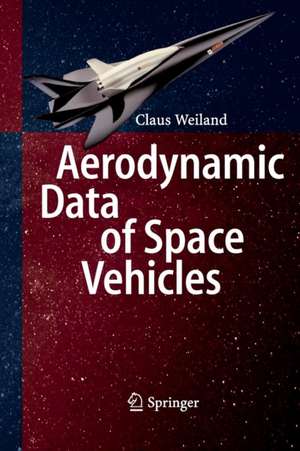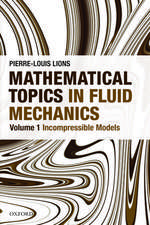Aerodynamic Data of Space Vehicles
Autor Claus Weilanden Limba Engleză Paperback – 27 sep 2016
In this book the aerodynamics of 27 vehicles are considered. Only a few of them did really fly. Therefore the aerodynamic data bases are often not complete, in particular when the projects or programs were more or less abruptly stopped, often due to political decisions. Configurational design studies or the development of demonstrators
usually happen with reduced or incomplete aerodynamic data sets. Therefore some data sets base just on the application of one of the following tools: semi-empirical design methods, wind tunnel tests, numerical simulations. In so far a high percentage of the data presented is incomplete and would have to be verified.
Flight mechanics needs the aerodynamic coefficients as function of a lot of variables. The allocation of the aerodynamic coefficients for a particular flight operation at a specific trajectory point is conducted by an aerodynamic model. The establishment of such models is described in this book.
This book is written for graduate and doctoral students to give them insight into the aerodynamics of the various flight configurations. Further for design and development engineers in industry and at research institutes (including universities) searching for an appropriate vehicle shape, as well as for non-specialists, who may be interested in
this subject. The book will be helpful, too, in the case that system studies require in their concept phases the selection of suitable vehicle shapes.
| Toate formatele și edițiile | Preț | Express |
|---|---|---|
| Paperback (1) | 1051.68 lei 6-8 săpt. | |
| Springer Berlin, Heidelberg – 27 sep 2016 | 1051.68 lei 6-8 săpt. | |
| Hardback (1) | 1056.09 lei 6-8 săpt. | |
| Springer Berlin, Heidelberg – 13 mar 2014 | 1056.09 lei 6-8 săpt. |
Preț: 1051.68 lei
Preț vechi: 1282.53 lei
-18% Nou
Puncte Express: 1578
Preț estimativ în valută:
201.27€ • 209.35$ • 166.16£
201.27€ • 209.35$ • 166.16£
Carte tipărită la comandă
Livrare economică 14-28 aprilie
Preluare comenzi: 021 569.72.76
Specificații
ISBN-13: 9783662520468
ISBN-10: 366252046X
Pagini: 371
Ilustrații: XVI, 355 p. 403 illus., 269 illus. in color.
Dimensiuni: 155 x 235 x 20 mm
Greutate: 0.52 kg
Ediția:Softcover reprint of the original 1st ed. 2014
Editura: Springer Berlin, Heidelberg
Colecția Springer
Locul publicării:Berlin, Heidelberg, Germany
ISBN-10: 366252046X
Pagini: 371
Ilustrații: XVI, 355 p. 403 illus., 269 illus. in color.
Dimensiuni: 155 x 235 x 20 mm
Greutate: 0.52 kg
Ediția:Softcover reprint of the original 1st ed. 2014
Editura: Springer Berlin, Heidelberg
Colecția Springer
Locul publicării:Berlin, Heidelberg, Germany
Cuprins
The Discipline Aerodynamics.- Classi¯cation and Comprehension of Space Vehicles.- Aerothermodynamic Data of Non-winged Re-entry Vehicles (RV-NW)Capsules and Probes.- Erothermodynamic Data of Non-winged Re-entry Vehicles (RV-NW).- Cones and Bicones.
Recenzii
“This book will be of particular interest of those who are involved or interested in high performance space vehicles, re-entry systems and re-useable launch vehicles. … The reference lists at the end of each chapter is extensive and provides the reader with ample opportunity to explore each vehicle further if needed. … book would make a useful addition to any technical library being a useful source for vehicle design and for the validation and verification of high speed CFD simulations.” (Dr. Malcolm Claus, The Aeronautical Journal, October, 2017)
Textul de pe ultima copertă
The capacity and quality of the atmospheric flight performance of space flight vehicles is characterized by their aerodynamic data bases. A complete aerodynamic data base would encompass the coefficients of the static longitudinal and lateral motions and the related dynamic coefficients.
In this book the aerodynamics of 27 vehicles are considered. Only a few of them did really fly. Therefore the aerodynamic data bases are often not complete, in particular when the projects or programs were more or less abruptly stopped, often due to political decisions. Configurational design studies or the development of demonstrators
usually happen with reduced or incomplete aerodynamic data sets. Therefore some data sets base just on the application of one of the following tools: semi-empirical design methods, wind tunnel tests, numerical simulations. In so far a high percentage of the data presented is incomplete and would have to be verified.
Flight mechanics needs the aerodynamic coefficients as function of a lot of variables. The allocation of the aerodynamic coefficients for a particular flight operation at a specific trajectory point is conducted by an aerodynamic model. The establishment of such models is described in this book.
This book is written for graduate and doctoral students to give them insight into the aerodynamics of the various flight configurations. Further for design and development engineers in industry and at research institutes (including universities) searching for an appropriate vehicle shape, as well as for non-specialists, who may be interested in
this subject. The book will be helpful, too, in the case that system studies require in their concept phases the selection of suitable vehicle shapes.
In this book the aerodynamics of 27 vehicles are considered. Only a few of them did really fly. Therefore the aerodynamic data bases are often not complete, in particular when the projects or programs were more or less abruptly stopped, often due to political decisions. Configurational design studies or the development of demonstrators
usually happen with reduced or incomplete aerodynamic data sets. Therefore some data sets base just on the application of one of the following tools: semi-empirical design methods, wind tunnel tests, numerical simulations. In so far a high percentage of the data presented is incomplete and would have to be verified.
Flight mechanics needs the aerodynamic coefficients as function of a lot of variables. The allocation of the aerodynamic coefficients for a particular flight operation at a specific trajectory point is conducted by an aerodynamic model. The establishment of such models is described in this book.
This book is written for graduate and doctoral students to give them insight into the aerodynamics of the various flight configurations. Further for design and development engineers in industry and at research institutes (including universities) searching for an appropriate vehicle shape, as well as for non-specialists, who may be interested in
this subject. The book will be helpful, too, in the case that system studies require in their concept phases the selection of suitable vehicle shapes.
Caracteristici
Structural and competent collection of Aerothermodynamic Data of Space Vehicles Combines data from the leading space agencies such as NASA, ONERA, CNES, CIRA, NLR, VKI, EHA, DLR, ESA, ESTEC Written by a leading expert in the field















